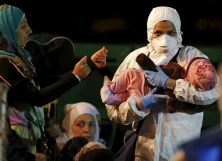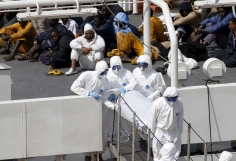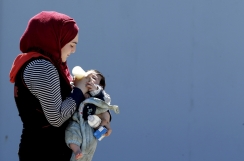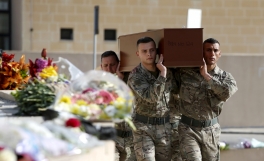The recent tragedies of vessels capsizing and hundreds of people drowning have once again highlighted that the Mediterranean Sea has become a mass grave.
Every year tens of thousands of migrants risk perilous journeys as they see no other alternative to the situations in which they find themselves.
These situations are often unbearable, whether because of persecution in a state like Eritrea, a civil war like in Syria or being stranded among militias and growing racism in a country like Libya.
These unbearable situations need to change for the better and addressing the root causes of forced migration is a priority. But it does seem likely that people will also still need to flee across the sea. What can be done to stop the deaths in the Mediterranean?
As an immediate measure, EU member states need to step up their search and rescue efforts. Last year's Mare Nostrum operations, in which the Italian Navy and coastguard proactively searched for people, has shown that the number of deaths can be substantially be reduced if the political will is there and resources are made available. Given that the Mediterranean is the border for the whole of Europe, it should be a jointly resourced operation of all EU member states.
Most importantly, however: serious efforts should be made to create legal and safe pathways for those needing to flee. These pathways would provide viable and safe alternatives to the journeys with overcrowded boats which are not seaworthy. They would effectively eradicate the need to resort to people-smuggling. This way, they would also put smugglers out of business.
Among the safe and legal pathways, refugee resettlement should play a major part. This mechanism by which refugees who have fled their home country – eg Syria – for another country – eg Lebanon – but cannot integrate there permanently are moved on to a third country which accepts them for good. So far the figures of refugees resettled to Europe remain minimal. A major commitment to higher quotas by the EU and its member states should help to make this a more meaningful way of opening a path out of some of the worst refugee situations at the doorsteps of Europe.
Another of the safe pathways would be to offer increased possibilities for family reunification in any of the EU member states. Many families would be happy to host their relatives, but need to be allowed to do so.
A measure which will only affect a smaller number of refugees is the issuing of humanitarian visas: here embassies would have a central role in identifying those who might be in need of refugee protection and handing them visas so that they can enter the EU legally.
A more important step would be the temporary lifting of visa requirements for countries in conflict. While the EU regularly appeals to states adjoining Syria, for example, to keep borders open, it has itself closed the borders to most countries of conflict.
It is obvious that the measures outlined above will cost money. It is also clear that these measures will mean that Europe takes in more refugees than before. It is however not likely that there will be a mass exodus from the south and east of the Mediterranean. Most refugees prefer to and will stay in the region. Further help to refugee protection in the region will therefore need to go hand in hand with measures facilitating safe and legal access. The central question now is: will Europe uphold its humanitarian heritage even if it is costly, or is this too much to ask?
Dr Torsten Moritz is the executive secretary of the Churches Commission for Migrants in Europe.

















